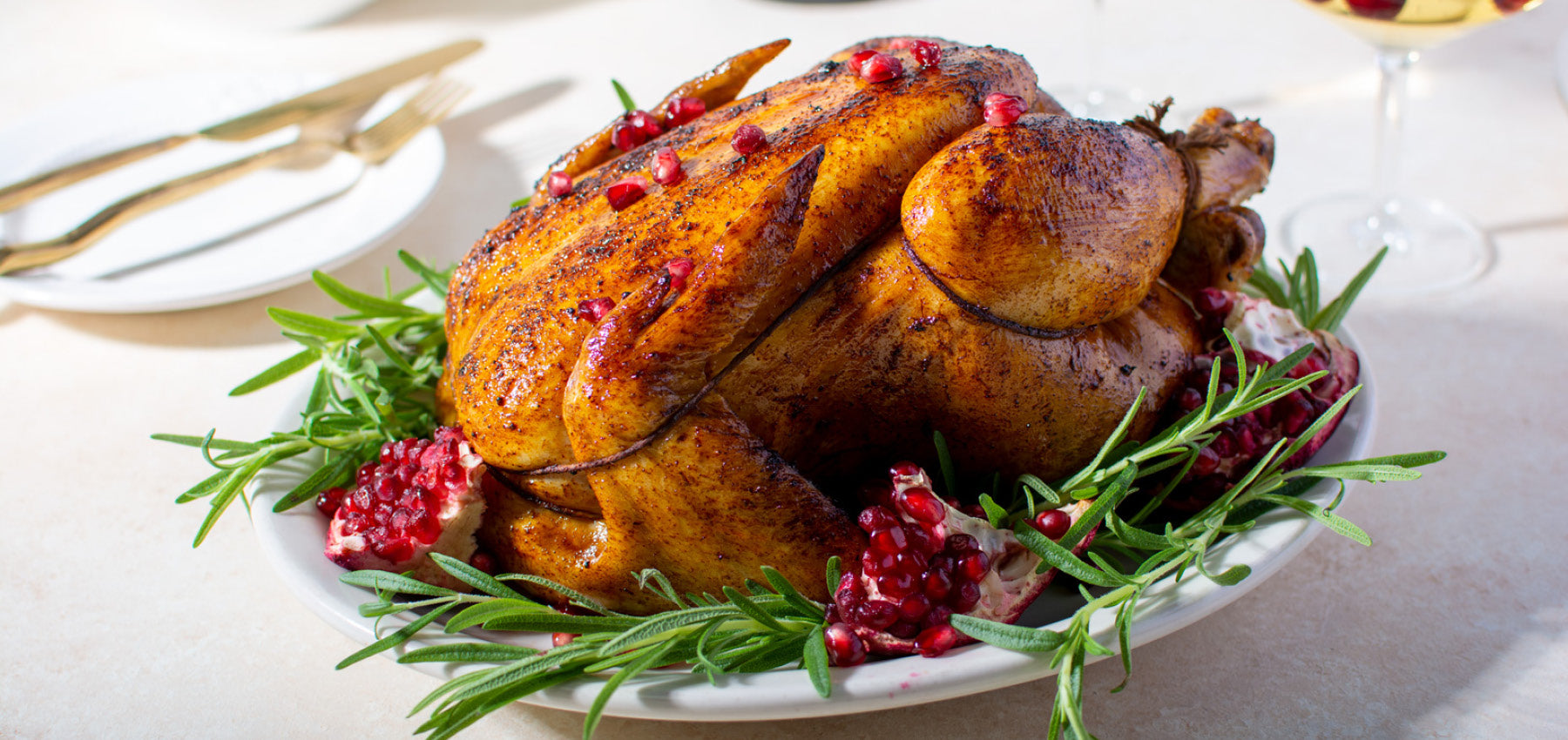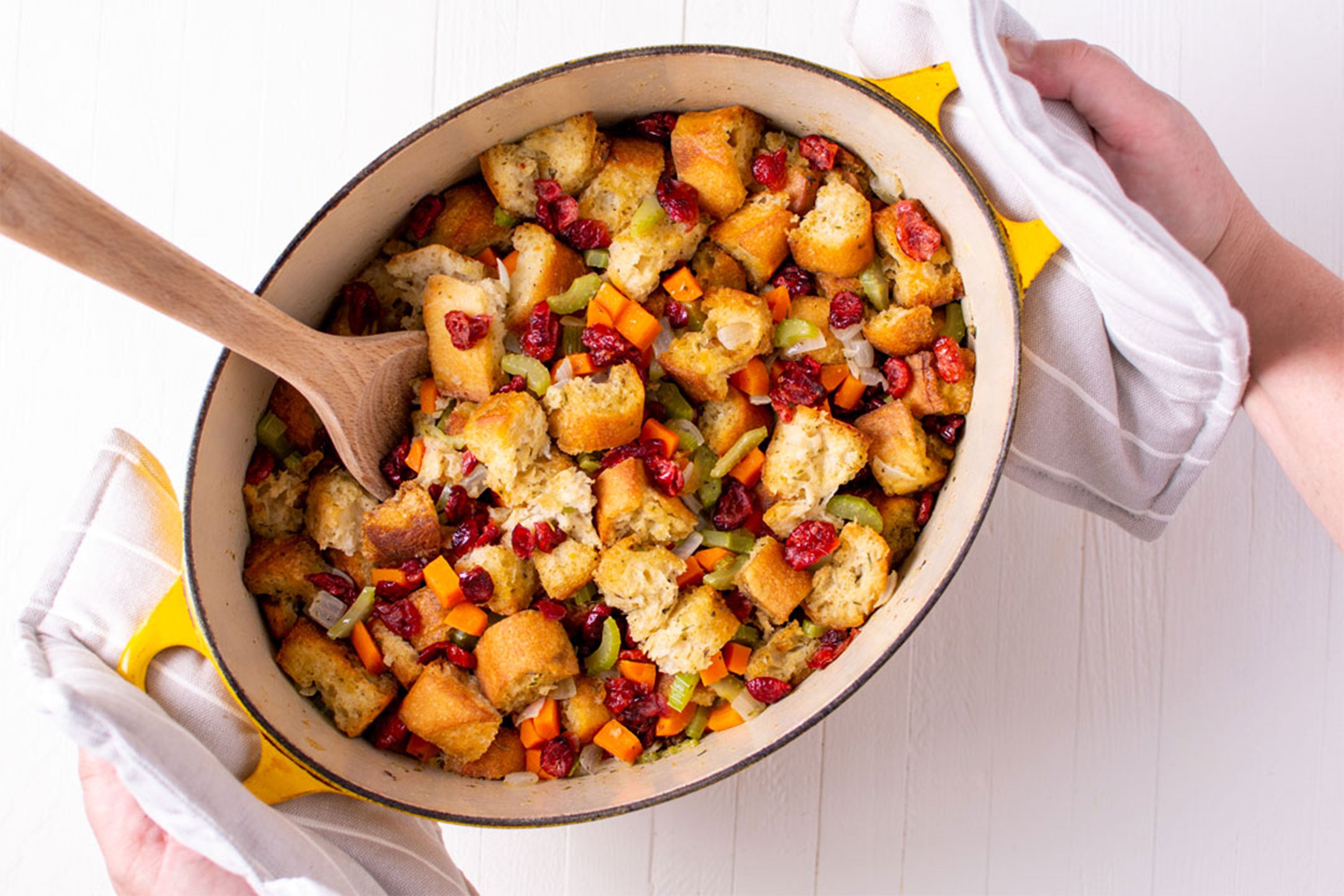How to Make the Perfect Roast Turkey

You’ve heard the gossip: the talk that turkey is dry, flavorless, and—the most horrible lie of all—that ham is better. This year though, we’re giving you a few tips to make a turkey that breaks down all stigmas: a bird that is golden brown, delicious, and—dare we say—moist.
Brine It
The trick to getting a turkey that is succulent from breast to drumstick? Brining. It takes a little extra planning and effort, but it’s oh-so-worth-it for meat that is flavorful and juicy. Our Turkey Brining Kit (available in the fall) keeps it simple with a pre-mixed combo of salt, sugar, and spices, that's ready for action. It comes with a brining bag and step by step instructions to make it simple. Check out our Turkey Brining instructions to see how easy it is to brine.
Pro Tip: The rule of thumb for brining is an hour per pound. So, for best results, plan on mixing up your brine the day before you want to cook your turkey.
If you're mixing it up and plan to fry or smoke your turkey, brining is still beneficial as it locks in the moisture before you start cooking. Want to make your own brine? Use a ratio of 1 gallon water to 1 cup salt and 1/2 cup sugar. Flavor it with 2 to 3 Tbsp. of your favorite herbs, seeds, peppercorns, and don't forget Minced Garlic. Let your bird brine (1 hour per pound), then drain and pat dry before roasting (no rinsing required). You will need to keep your turkey refrigerated during the brining process. For the science of brining and more information about how it works, check out our Brining 101 blog post.

Season It
After brining infuses the inside of your turkey with flavor, you’ll want to treat the skin to some deliciousness of its own. Brush with melted butter, which will help your spices stick and will also aid in browning. Sprinkle generously with a blend like Poultry Seasoning, Bohemian Forest, or Thanksgiving’s best friend—Holiday Roast Turkey (available exclusively in the fall). Remember that your turkey will already be salted on the inside from the brine so avoid blends that are too salty.
A glaze is a great alternative to a rub if you want something different. Make a simple glaze with equal parts maple syrup and orange juice and a big pinch of dried herbs like Summer Savory, Marjoram, Rubbed Sage, and/or French Thyme. Simmer the glaze until it is sticky and brush on your turkey during the last hour or so of roasting.
Even better? Combine the flavor of a glaze with the ease of a seasoning by rubbing your turkey with Park Hill Maple Spice before roasting. You'll end up with a sweet and herby glaze on the finished bird.

Stuff It?
The stuffing debate is controversial—I know. But I’d like to share a few reasons why you may want to enjoy your stuffing (or dressing, depending on where you’re from) on the side.
- It's risky. By stuffing an uncooked turkey, the bread might be soaking up raw poultry juices that could contain Salmonella. Because the dressing sits in the middle of the bird, it may not reach 165 degrees (the temperature at which most foodborne pathogens are killed) by the time the rest of the turkey is fully cooked. What does this mean? You may end up with either an overcooked turkey or undercooked stuffing.
- If you don’t want to give up the tradition of having the stuffing in the turkey, you can follow Alton Brown’s tip and scoop the prepared stuffing into the turkey during the post-roasting resting period so it can safely soak up the tasty drippings.
- Leaving the stuffing out makes room for flavor boosters. Add aromatics like sliced apples and onions, citrus peels, Crystalized Ginger, or fresh herbs that will continue to add flavor from the inside out. Discard the aromatics before carving.
- By preparing your dressing on the side, you have more control over the flavor and texture so you don’t risk getting a bland, mushy stuffing. Whether you stuff the turkey after roasting or serve it on the side (to preserve those awesome crispy bits!), try out our Cornbread Dressing recipe for something a little unique or go traditional with Sage & Savory Stuffing which features our Poultry Seasoning.

Cook It
To make the perfect turkey, it’s absolutely essential to use a thermometer (but not the ridiculous pop-up timer that comes with most grocery store turkeys). For best results, use a digital thermometer that is equipped with a probe wire and a temperature alert.
To use, stick the probe into the thickest area of the breast or thigh and set the temperature alarm for 160 degrees or 170 degrees respectively. Then, you can close your oven on the wire and have the display unit sitting on your counter during cooking. This will give you more accurate internal temperature readings, prevent overcooking, and actually shorten overall roasting time because you won’t be losing oven heat every time you open the door to temp the bird. Win-win-win!
Need a basic method for cooking your turkey? Probe the breast or thigh with an oven-safe thermometer, roast at 450 degrees for 30 min. to start the browning process, then turn the oven down (without opening) to 350 degrees and roast the turkey for an additional 1 to 3 hours (depending on the size).
If you notice that either the tips of the wings/drumsticks or the top of the breast are getting too brown for your liking, cover those parts with foil. Otherwise, there’s no need to cover or place a lid on your entire pan. By not using a lid, you’ll ensure a golden turkey with crispy skin that your dinner guests will love you for.

Serve It
Now you have the perfect turkey, but what is a holiday feast without some scrumptious sides? You can definitely go conventional, and we respect that, but it's also a great opportunity to swap out one or two side dishes for fresh new flavors.
Get your greens. For a traditional option, you'll want to have Green Bean Gratin but for a fresh new twist on greens, try Bucktown Mustard Brussels.
Pass the potatoes! Herbed Mashed Potatoes are sure to be a crowd pleaser but give your spuds a spin with Maple Whipped Sweet Potatoes.
Craving cranberries? We know some people insist on having this fresh out of the can. We're not those people. Mulled Cranberry Sauce is a classic, while Chai Cranberry Fizz turns a standard side into a delicious drink.
Pumpkin pie, please! Hope you saved room for dessert. Our Pumpkin Pie Spice is only available in the fall but you can add a pinch of ground cloves to Baking Spice to replicate the flavor any time of year. The classic Old-Fashioned Pumpkin Pie is a crowd-pleaser but fresh from the test kitchen comes a tasty twist, Pumpkin Cheesecake Bars. We can't stop there so we're throwing in a bonus round of classic Grandma Menard's Pumpkin Chiffon Pie vs. modern spin Pumpkin Pie Ice Cream.
Double down on dessert. Look, pumpkin might be king but it's not the only pie in town. (More for you!) So here are a few more desserts to finish your feast. Our Spiced Apple Bake makes a super easy apple crumble that's great a la mode. But for an unexpected apple dessert, how about Baked Apple Donuts. Pecan Tarts are a petite version of a traditional pie but give it a tasty twist and try Espresso & Cocoa Pecan Pie.
Cheers! Enjoy a cup of Mulled Wine to finish off the evening.
Are there any turkey tips that we missed? What’s your favorite Thanksgiving dish or tradition? Talk to us on Facebook, or by tagging us with @savoryspiceshop on Instagram. Have a wonderful (and Savory)Thanksgiving!

Leave a comment